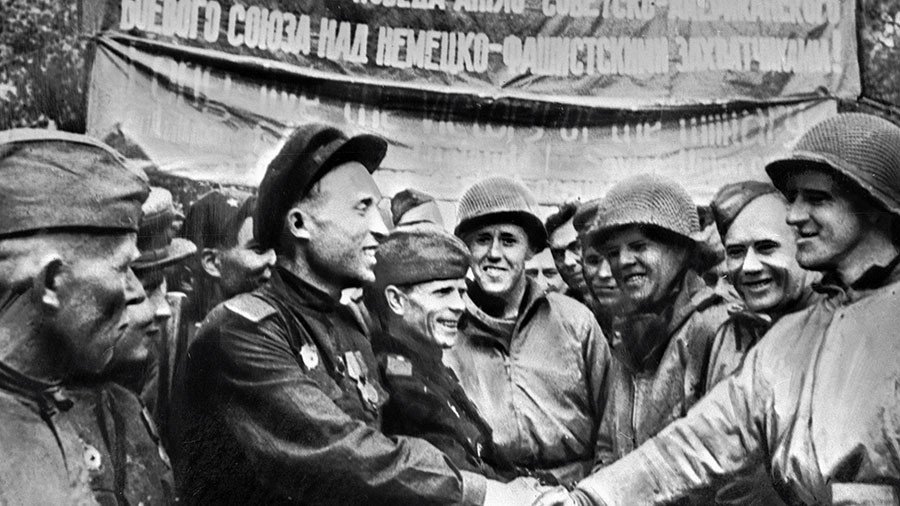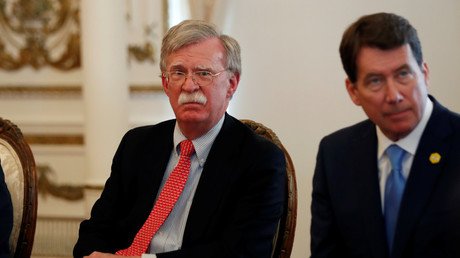US-Russia relations a long way from World War II ‘Meeting at the Elbe’

This week commemorates the day when US and Soviet troops linked up forces in Germany, essentially crippling the Nazis. That historic moment underscores the value of US-Russia unity – something which is conspicuously missing today.
Although not celebrated as an official holiday by any country, ‘Elbe Day’ has won a place in the history books as the galvanizing moment when troops from the US Army linked up with the Soviet Army near the German town of Torgau on April 25, 1945. The famous meeting in the waning moments of World War II sounded the death knell for Adolf Hitler and his plan for creating ‘lebensraum’ for the German people.
Less than a week after the historic meeting along the serene banks of the Elbe River, the Soviet Army, led by Russian General Georgy Zhukov, went on to conquer Berlin.
Although I am somewhat wary of mentioning it – considering America’s sudden aversion to historical monuments, not to mention all things Russian – there can be found in Arlington National Cemetery, just across the Potomac River from Washington, DC, a modest monument that commemorates that historic meeting.
The plaque reads, in both English and Cyrillic: “In recognition of the cooperation by American, Soviet and allied armed forces during World War II. This marker symbolizes the link up of Soviet and American elements at the Elbe River on 25 April 1945.”
In addition to symbolizing the demise of Nazi Germany, the famous meeting demonstrated the ability of Americans and Russians to put aside their political differences and work together in common cause. So what is preventing such camaraderie today, when there is no shortage of mutual enemies, not to mention cold-blooded terrorists, to threaten the dream of democracy?
Cold War hangover
It goes without saying that relations between the United States and Russia, despite that moment of bilateral brotherhood witnessed at the Elbe, were hardly rosy in the years following the end of World War II. The military division of Germany into East and West, the Cuban Missile Crisis and the Vietnam War were just a few of the dangerous flashpoints in the decades-long Cold War.
Then, on December 25, 1991, with the sudden and largely unexpected collapse of the Soviet Union, there emerged a rare window of opportunity as far as US-Russia relations were concerned. Yet the fleeting moment was arguably fumbled by Washington, then experiencing the birth pangs of its unipolar moment, as it attempted to recreate Russia into some twisted knockoff of itself. This was a very telling moment for understanding how the US perceives Russia.
As Stephen Cohen explained, as Russia was struggling to transform itself under President Boris Yeltsin, the Clinton administration was working hard behind the scenes to create the "Russia we want."
Here was American arrogance and hypocrisy at its finest hour.
“In that spirit, legions of American political missionaries and evangelists, usually called ‘advisers,’ spread across Russia in the early and mid-1990s,” Cohen wrote.
“Among other missionary deeds, US citizens gave money to favored Russian politicians, instructed ministers, drafted legislation and presidential decrees, underwrote textbooks, and served at Yeltsin's reelection headquarters in 1996.”
Here we have 100 percent evidence of an authentic ‘Something Burger’ – raw, unadulterated election meddling, waged against Russia on behalf of the US government, to influence the outcome of the 1996 Russian elections in favor of Boris Yeltsin. And we know it is true because the Americans proudly admitted it.
In 1996, Time magazine celebrated this outright manipulation of democracy with a cover story entitled: “Yanks to the rescue: The secret story of how American advisers helped Yeltsin win.” The end result of this Western assistance was IMF-inspired ‘shock therapy’ economic policies that wreaked absolute havoc on the Russian population, struggling as it was to survive the harsh new realities of unfettered, hyper-liberal capitalism.
Is it any coincidence that this single ‘bright spot’ in US-Russia relations in recent memory came about during the Clinton-Yeltsin years, when Russia was struggling back from the brink of disaster after its experiment with communism failed? Does the US only look at Russia as an 'equal partner' when Moscow is wracked with internal problems and on the verge of collapse?
This cynical approach to Russia is the thread that weaves itself throughout the Cold War right up until the present: Even after Russia had given up on Marxist ideology, US policymakers and associated think tanks never stopped analyzing Russia through the cracked lens of the Cold War. As a result, the clueless Western world only perceives Russia as either a helpless patient or an aggressive enemy, but never as the invaluable ally it proved to be during the fight against Nazi Germany.
There are some obvious reasons for the Western establishment’s cynical attitude and approach to Russia. For example, imagine what would happen if the Western media suddenly stopped hyping Russia as some sort of existential threat to the West. NATO as a military bloc would simply give up the ghost on its own accord; member states would no longer feel obliged to keep the Cold War dinosaur alive. Naturally, this would be an unmitigated disaster for Washington and its army of defense sector lobbyists, which daily feed off the carcass of US democracy like so many ravenous vultures.
Thus, not only is the US forced to shun cooperation with Russia in the realm of military-related projects, like the US missile defense system in Eastern Europe (which has upset the regional strategic balance), as well as in the fight against terrorists (as witnessed in the Syrian debacle), Russia is being accused of a series of crimes without a shred of evidence or due process – from meddling in US elections, to being complicit in a chemical attack against innocent civilians in Syria.
The vast distance that we have traveled in bilateral relations from the historic American-Soviet meeting on the Elbe could best be summed up with the simply deranged comments of US ambassador to the United Nations, Nikki Haley, who proclaimed Russia will “never be America’s friend.”
‘Russia will never be our friend, we’ll slap them when needed’ – US envoy to UN https://t.co/EC8Kt0pZEGpic.twitter.com/RQlZiguLQF
— RT (@RT_com) April 6, 2018
Before her spell as UN ambassador expires, Haley may wish to watch a translated copy of the 1949 Soviet-era film, ‘Meeting on the Elbe’, which concludes with the acute observation: “The friendship between the people of Russia and America is the most important issue that mankind now faces.”
Think your friends would be interested? Share this story!
The statements, views and opinions expressed in this column are solely those of the author and do not necessarily represent those of RT.

















